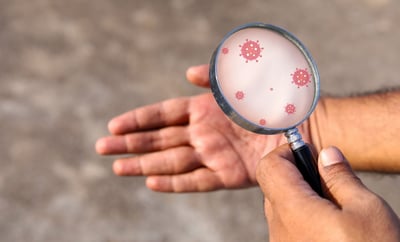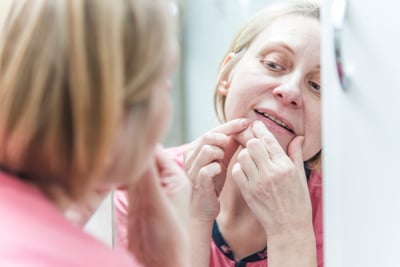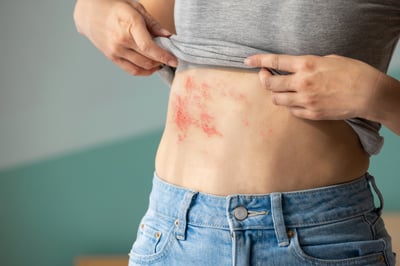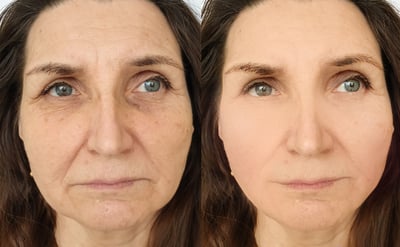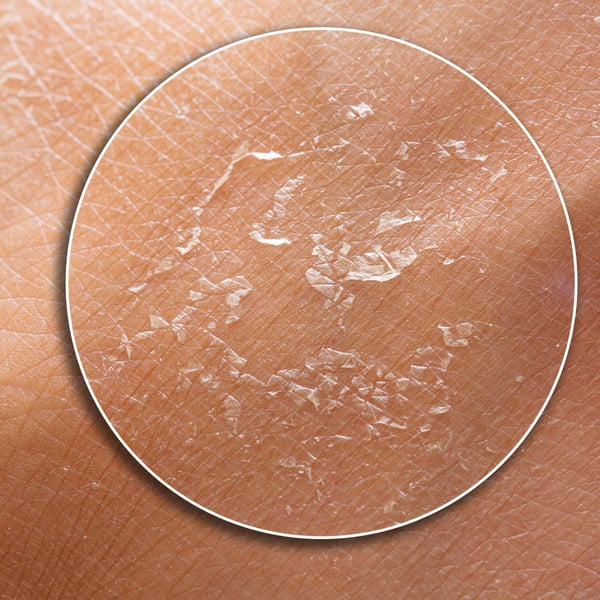
With a constant stream of skincare tips from TikTok and a million products to choose from, it can be hard to tell which routine or product is actually good for your skin. Unfortunately, some tips, tricks, and wonder products do more harm than good.
So, how do you know if your skincare routine is actually harming your skin?
Most likely, the first signs will show up as damage to your skin barrier. Let’s take a look at what that means, how the skin barrier gets damaged, and ways to keep it healthy.
What is the skin barrier?
Your skin barrier, or stratum corneum, is very much what it sounds like–the outermost layer of your skin that acts as a barrier against harmful substances. The skin barrier also helps to keep your body hydrated by holding in moisture. A damaged skin barrier allows water to escape and evaporate more easily.
The cells that make up your skin barrier form a brick wall-like pattern, while lipids (fats) like cholesterol, ceramides, and fatty acids act as the mortar holding the cells together. This structure works to protect your skin from:
- Environmental pollution
- Bacteria
- Ultraviolet light from the sun
- Other toxins that come into contact with your skin
How to identify skin barrier damage
As your skin barrier gets damaged, you might start to notice changes like:
- Dryness and flaking
- Increased inflammation and redness
- Itchiness and irritation
- Skin infections
- Acne
- Increased sensitivity
- Decreased elasticity
- Appearance of wrinkles/thinner skin
At first, you may only experience some dryness and slight irritation, but when your skin barrier continues to deteriorate, your skin can become prone to infection, more acne, and can look unhealthy. Research also suggests that skin conditions like rosacea, dermatitis, and psoriasis are all linked to skin barrier damage.
Skincare mistakes that harm your skin barrier
If you think your skin barrier is damaged, it might help to know that you have options when it comes to repairing it. The first step is to take a close look at your skincare routine and identify any potential causes of damage. Here’s a list of common skincare mistakes:
1. Over-exfoliation
Exfoliation is great for removing dead skin cells, but it’s not something you should do every day. Too much exfoliation can damage your skin barrier if you don’t give it time to recover between exfoliation sessions, or if you are scrubbing your skin too aggressively. Aim for a couple of times a week and use a gentle exfoliant, especially if you have sensitive skin.
2. Using harsh cleansers
Your skin is naturally slightly acidic. Using cleansers or other products with harsh ingredients that are too acidic or alkaline can contribute to skin barrier damage. Studies have proven that skin benefits most from products that have a pH of 4.0-5.0. You may be able to find products that state their pH online or on the bottle, or you can use test strips to find the pH of any product. Opt for fragrance-free cleansers to avoid unnecessary chemicals.
3. Under-moisturizing
Under-moisturizing can compromise the skin barrier over time. Using a good moisturizer will help protect your skin barrier, especially after exfoliating, cleansing, or when it is very dry or cold outside. Moisturizers with ingredients like ceramides, glycerine, hyaluronic acid, and petrolatum can help to repair the skin barrier.
4. Forgetting sunscreen
While the skin barrier does help to block UV rays, it can only handle so much. Even when your skin barrier is in good condition, you should wear sunscreen regularly to protect it from damage. Here are some of our best sun safety tips.
5. Ignoring sensitive skin
Some people are prone to having more sensitive skin, but sometimes sensitive skin is a symptom of a damaged skin barrier. Either way, it should be treated with a specialized sensitive skin routine. This means using gentler products that are specifically designed for sensitive skin and avoiding things known to irritate your skin.
6. Using hot water
A long, hot shower can feel nice, but it’s probably damaging your skin barrier. Research has shown continuous hot water usage causes damage to the skin barrier, resulting in water loss and increased dehydration. Opt for cold or lukewarm water when washing instead.
Tips for a healthy skin barrier
In addition to avoiding skincare mistakes, there are plenty of ways to repair your skin barrier or just ensure that it stays in tip-top shape. If you want to give your skin barrier a boost, try:
- Getting a good night’s sleep. Getting enough sleep allows your body to heal damage more effectively.
- Try personalized skincare. Everyone is different and new technologies are giving people more opportunities to understand their skin’s needs on a more personalized level. This allows you to find products or treatments that will optimize your skin health without wasting time and money on unhelpful (or damaging) products.
- Eat a balanced diet. As with most health concerns, eating healthier foods can lead to improvements in skin health. Foods high in omega 3 fats, like salmon, nuts, and avocado, help to improve the skin barrier, as well as foods that are high in antioxidants, like berries, bananas, and green vegetables.
- Try niacinamide. Niacinamide, a form of vitamin B3, has been shown to improve the skin barrier, reduce inflammation, and improve skin texture. It can be purchased over the counter, but prescription strength niacinamide from a Board-certified Dermatologist might be more effective.
- Avoid smoke and other pollutants. It’s not usually possible to stay away from air pollution 100% of the time, but reducing the time you spend near heavy pollution and not smoking can protect your skin barrier (and general health) from damage.
Need help repairing your skin barrier?
Whether you want to find a facial that helps restore your skin barrier or discuss a long-term skin barrier repair strategy with a Board-Certified Dermatologist, Forefront can help. Our professional medical staff can help you identify what is harming your skin barrier and then find the right treatment or sensitive skin routine. Contact us today to set up an appointment.
